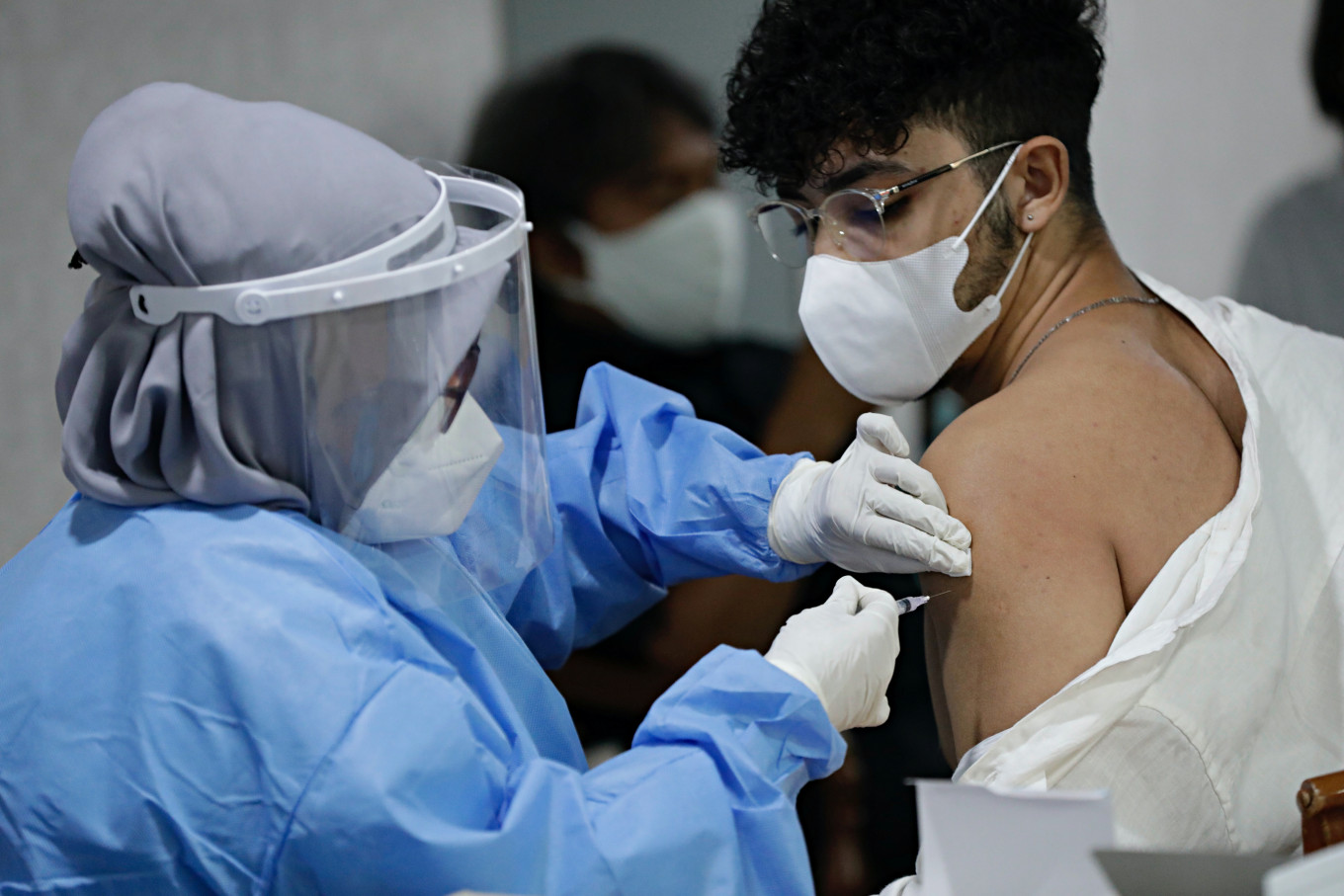Popular Reads
Top Results
Can't find what you're looking for?
View all search resultsPopular Reads
Top Results
Can't find what you're looking for?
View all search resultsNew daily jab target set, but old problems linger
Fixing technical problems as important as increasing daily jabs, experts say
Change text size
Gift Premium Articles
to Anyone
T
he government has set a new target of administering 2.5 million COVID-19 vaccine shots per day in October, but experts called on the government to address fundamental issues, particularly improving vaccine access to vulnerable groups, before setting new daily goals.
The target was set to meet the government’s target of inoculating 80 percent of the targeted population in the country’s national vaccination program by the end of this year.
Health Ministry acting director general for disease control and prevention Maxi Rein Rondonuwu said to reach the new target, the ministry had teamed up with the National Police, Indonesian Military (TNI), State Intelligence Agency (BIN) and Indonesian Red Cross (PMI).
He admitted that reaching the new vaccination goal within its targeted timeframe would be “a little difficult”, but added that in the effort to ramp up distribution capacity, the ministry had also cooperated with other institutions to open up more vaccination centers to the public.
"We're also cooperating with the House of Representatives, Financial Services Authority [OJK], banks, religious institutions and universities to set up more vaccination centers," Maxi said recently.
In September, the Health Ministry only managed to reach its daily vaccination target of 2.3 million doses twice, while the average daily inoculation rate stood only at 1.6 million doses a day over the same period.
Persisting problems
Rather than expanding the capacity to administer COVID-19 vaccines, experts and watchdogs have urged the government to address fundamental problems that have hindered the progress of its national vaccination drive.
Amanda Tan of independent data initiative LaporCOVID-19 highlighted that data problems and technical challenges had led to people being unable to receive their vaccine doses.
“We have received reports that eligible recipients cannot get vaccinated because their identification numbers have been used by other people,” Amanda told The Jakarta Post on Sept. 27. “People also complained that health authorities failed to input their vaccination data to the system after the first jab, which left them unable to receive notification about their scheduled second shots and also meant they were unable to show proof that they had received the first dose.”
Others also complained that they struggled to get the second dose of the vaccine because the vaccination centers where they received their first jab had run out of stock of certain vaccine brands, which led to increased vaccine wastage in some regions, Amanda added.
In Aceh, for example, almost 2,000 doses of Sinovac vaccines were discarded last month as fewer people turned up to get vaccinated.
"One vial of Sinovac vaccine could be used [to vaccinate] 10 people, but sometimes only around six people came to the vaccination centers. When a multi-dose vial is opened, but not completely used during its open vial life, the unused doses are thrown out," Head of Aceh Health Agency's disease control and prevention Sukri Manto said, as reported by Tribunnews.com.
Amanda said ramping up vaccination targets without addressing current problems could lead to more unequal access to COVID-19 vaccines across the country, which could leave vulnerable groups behind in the government’s COVID-19 inoculation campaign.
Agglomeration strategy
The unequal access to COVID-19 vaccines across the country is partly attributed to the government’s inoculation strategy of prioritizing urban agglomeration areas and provincial capitals, arguing that the areas that have higher population densities carry more risk of COVID-19 transmission.
National COVID-19 taskforce spokesperson Siti Nadia Tarmizi said the government was aiming to administer first shots of COVID-19 vaccines to 70 percent of the targeted population living in agglomeration areas in Java and Bali by the end of September. A similar deadline was also set for provincial capitals outside the two islands by the end of October.
However, as of Monday, out of eight urban agglomeration areas in Java and Bali, only Bali’s Denpasar and its surrounding cities and regencies had reached the goal of covering 70 percent of the targeted population with the first dose, according to Health Ministry data.
Vaccination for the elderly, which is a targeted group in the national vaccination program, also remains low. As of Monday, only 4.45 million elderly people, 20 percent of the 21.5 million senior citizens eligible to receive a COVID-19 vaccine, had been fully inoculated.
As of Monday, 53.3 million people, 25.6 percent of the total of 208 million people targeted in the government’s vaccination campaign, had been fully vaccinated.
Griffith University epidemiologist Dicky Budiman said the government's move to expand the daily jabs target without addressing fundamental problems highlighted the government’s emphasis on reaching numerical milestones without ensuring equitable access, particularly for the country's vulnerable groups.










